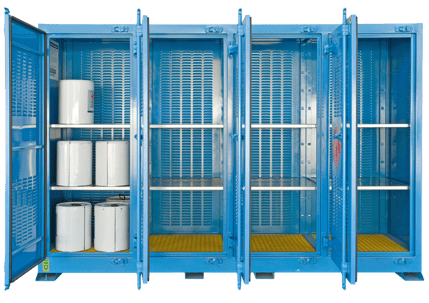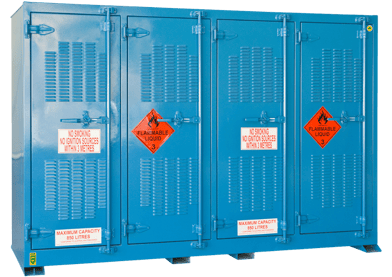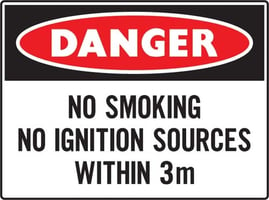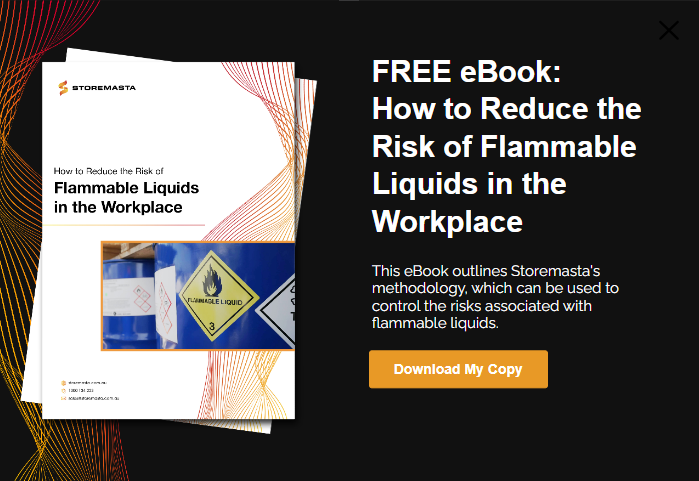Is your business carrying larger quantities of flammable liquids? Then it’s important that you’re familiar with the outdoor storage requirements of Class 3 Flammable Liquids. As these dangerous goods can easily ignite, you’ll need to make sure that flammable liquids are stored in a safe and protected outdoor environment. Keeping large quantities of these chemicals indoors is a non-compliant practice that will greatly increase the risk of fire, explosion and human harm. In this blog, we look at the outdoor storage requirements for flammable liquids, with recommendations that are in line with the requirements of Australian Standard AS 1940.
Storing Larger Quantities Of Flammable Liquids?The standard explains that indoor storage cabinets used for the storage of Class 3 Flammable Liquids must not be any larger than 850L. AS 1940 also states that no more than 850L of flammable liquids can be stored per 250 m2 of floor space.
Therefore, if you’re storing more than 850L of flammable liquid per 250 m2 of floor space, you will have to store these quantities of flammable liquids outdoors to comply with the standards.
Flammable liquids can be safely stored outdoors using a outdoor chemical storage container that has been designed and manufactured in full conformance to Australian Standards.
 If you have more than 850L of flammable liquids per 250m2, you must store these chemicals outdoor in a compliant storage container.
If you have more than 850L of flammable liquids per 250m2, you must store these chemicals outdoor in a compliant storage container.
We’ll unpack the requirements for Class 3 Flammable Liquids storage in an outdoor environment below:
Spill Containment
To minimise the chance and impact of chemical spills, outdoor flammable liquids stores must be able to contain any leaks or spills. If a drum leaks flammable liquids within your storage area, there must be the provision for spill containment and management.
This can be achieved by using a chemical storage container that is equipped with spill containment bund in the lower compound. The required spillage containment capacity for flammable liquids storage containers depends on the quantity of flammable liquids that are being stored within the container.
The spill containment quantities of flammable liquids are:
Facilities storing less than 10,000L
Spill containment capacity = 100% of the largest package within the store + 25% of the aggregate capacity of the store.
Facilities storing between 10,000L - 100,000L
Spill containment capacity = 100% or the largest package within the store + 25% of the aggregate capacity of the store + 10% of storage capacity between 10,000L and 100,000L.
Facilities storing more than 100,000L
Spill containment capacity = 100% or the largest package within the store + 25% of the aggregate capacity of the store + 10% of storage capacity between 10,000L and 100,000L + 5% of the storage capacity exceeding 100,000L
Ventilation
Flammable liquids are volatile substances which emit hazardous vapours. If these flammable vapours come into contact with an ignition source, they will ignite and cause a severe fire that could damage people, property and the environment.

Outdoor stores of flammable liquids can benefit from natural ventilation if fixed louvres are incorporated into the store design.
If large quantities of flammable vapours are inhaled by unsuspecting workers, it can result in nausea, asphyxiation and other serious health problems.
Flammable liquids storage containers must be ventilated to keep the concentration of the flammable vapours below the workplace exposure standards.
An efficient and effective way to ventilate flammable liquids storage containers is to have a natural ventilation system. AS 1940 states that a natural ventilation system on a flammable liquids store can be achieved by having two walls of fixed louvres open to the air.
Dangerous Goods Signage
As flammable liquids will easily ignite and cause intense and rapidly burning workplace fires, it’s vital that all outdoor flammable liquids storage containers have the relevant safety signage in place. All workers and visitors to your worksite need to be warned of the potential hazards associated with storing flammable liquids.
All flammable liquids stores must be marked with a Class 3 Flammable Liquids sign. This allows workers to be aware of the substances that are stored within the facility. It also prevents flammable liquids being place near other incompatible classes of dangerous goods —which can result in a devastating chemical reaction.
And as flammable liquids will easily ignite in the presence of an ignition source, your storage facilities must be clearly marked with a sign that states “No Smoking No Ignition Sources Within 3m”.
No Smoking No Ignition Sources Within 3m

Eye Wash Station & Safety Shower
As well as being extremely flammable, Class 3 dangerous goods are very toxic and hazardous to human health.
These chemicals will cause intense irritation and harm if they come into contact with the eyes or skin of workers. Exposure to these toxic substances can lead to a range of serious health problems including blindness, skin burns, asphyxiation and even cancer in chronic cases.
To avoid the risk of eye damage, all flammable liquids storage containers must be located next to emergency decontamination facilities.
AS 1940 explains that:
4.6 GENERAL REQUIREMENTS
(c) The following items shall be provided within 10 m of, but not nearer than 2 m, to stores where packages are opened:
(i) Eye wash facilities complying with AS 4775.
(ii) Water for the washing of hands.
(d) A safety shower shall be installed where—
(i) the quantity of liquids exceeds 2000 L; or
(ii) required by risk assessment or regulation.
NOTE: Safety showers should comply with AS 4775.
It’s important to note that all flammable liquids storage facilities must be accompanied by a compliant eye wash facility. You should install an eye wash station within 10 metres — but no closer than 2 metres — of your outdoor flammable liquid stores.
Does your flammable liquids storage container have more than 2000L of flammable liquids? Then a safety shower must also be installed within 10 metres of the container — but not closer than 2 metres. This will allow your staff to quickly wash these hazardous substances off their skin before they enter the bloodstream. In the event of a chemical spill or splash, every second counts, so ensure that you’re meeting the requirements of Australian Standards by installing decontamination equipment near your outdoor stores.
Are Your Outdoor Flammable Liquid Stores Compliant?
Are you meeting your compliance obligations for the safe storage of Class 3 Flammable Liquids in an outdoor environment? Larger quantities of these chemicals pose a real risk to your organisation, the environment and even your community. By understanding the requirements of AS 1940:2017, you’ll be able to effectively store your flammable liquids in a safe manner. Would you like to find out more about reducing the risks associated with flammable liquids? Our easy-to-read guide will take you through our 4-step risk control methodology. By using the IDENTIFY – ASSESS – CONTROL – SUSTAIN process, we’ll show you how to minimise the risks associated with storing Class 3 Flammable Liquids outdoors in your workplace. Get your copy of How To Reduce The Risk Of Flammable Liquids In The Workplace for free today.
Joining the team as a Dangerous Goods Storage Consultant, Melissa Hampton became Storemasta's Marketing Manager in late 2021. With extensive knowledge and experience in chemical compliance, Melissa is responsible for leading the Marketing team and helping shape their marketing strategy. In her spare time, you can find Melissa hiking, swimming and enjoying the great outdoors in beautiful north-west Tasmania.
